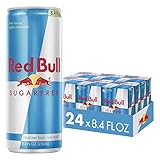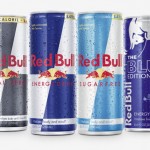Red Bull
Red Bull Energy Drink was created in Austria more than 31 years ago.
It is one of the very first energy drinks and is now distributed in more than 171 countries worldwide.
It is the #1 selling energy drink with 68 billion cans sold to date.
The incredibly popular energy drink has been a catalyst for dozens of imitations and has built a very strong brand - although the drink formulation has remained relatively unchanged.
Red Bull Energy Drink Variations
Although several flavor variations of Red Bull have come and gone over the years, their product line remains quite simple.
- Original
- Sugar -free
- Total Zero
- Red Edition- Cranberry
- Blue Edition- Blueberry
-
Silver Edition- Grapefruit/citrus (discontinued in USA) - Orange Edition - 12 fl. oz. can 114 mg of caffeine
-
Cherry Edition - 12 fl. oz. can 114 mg of caffeine - Yellow Edition - Tropical
- Green Edition - Kiwi Apple
- Lime Edition - Sugar-free
- Purple Edition - Sugar-free
All of these Red Bull flavor variations have the same amount of caffeine and other energy ingredients per ounce although the size of the can increase total caffeine.
Red Bull Energy Drink's secret to success appears to be their early inroads into bars and clubs for use in mixed drinks and its early sponsorship of extreme sports with their famous slogan :
"Red Bull Gives You Wings"
Science Behind Red Bull
Since Red Bull has been around a long time there are mounting scientific studies testing its effectiveness. Here are a few.
- Alford, C., Cox, H., & Wescott, R. (2001). The effects of red bull energy drink on human performance and mood. Amino acids, 21(2), 139-150. Study link
- Candow, D. G., Kleisinger, A. K., Grenier, S., & Dorsch, K. D. (2009). Effect of sugar-free Red Bull energy drink on high-intensity run time-to-exhaustion in young adults. The Journal of Strength & Conditioning Research, 23(4), 1271-1275. study link
- Astorino, T. A., Matera, A. J., Basinger, J., Evans, M., Schurman, T., & Marquez, R. (2012). Effects of red bull energy drink on repeated sprint performance in women athletes. Amino acids, 42(5), 1803-1808. study link
- Ragsdale, F. R., Gronli, T. D., Batool, N., Haight, N., Mehaffey, A., McMahon, E. C., ... & Wilson, T. (2010). Effect of Red Bull energy drink on cardiovascular and renal function. Amino acids, 38(4), 1193-1200. study link
Where To Buy Red Bull
Red Bull Energy Drink Sugar Free 24 Pack of 8.4 Fl Oz, Sugarfree (6 Packs of 4)
Price: $35.99 $35.99
Available from Amazon / Red Bull
Ingredients in Red Bull
Water, sucrose, glucose, acidifier sodium citrates, carbon dioxide, taurine (0.4%), glucuronolactone (0.24%), caffeine (0.03%), inositol, vitamins (niacin, pantothenic acid, B6, B12), flavourings, and colours (caramel, riboflavin).
Sugar content: 27 grams (per 8.46 ounces).
Compare Sugar ContentSimilar Items
Daredevil 240mgDead Red Xcelerator 0mg
Kona Red 54mg
Mountain Dew Code Red 54mg
Red Bull Blue Edition 80mg
Red Bull Cherry Edition 114mg
Red Bull Green Edition 114mg
Caffeine Concentration
Red Bull contains 9.46 mgs of caffeine per fluid ounce (31.98mg/100 ml).









